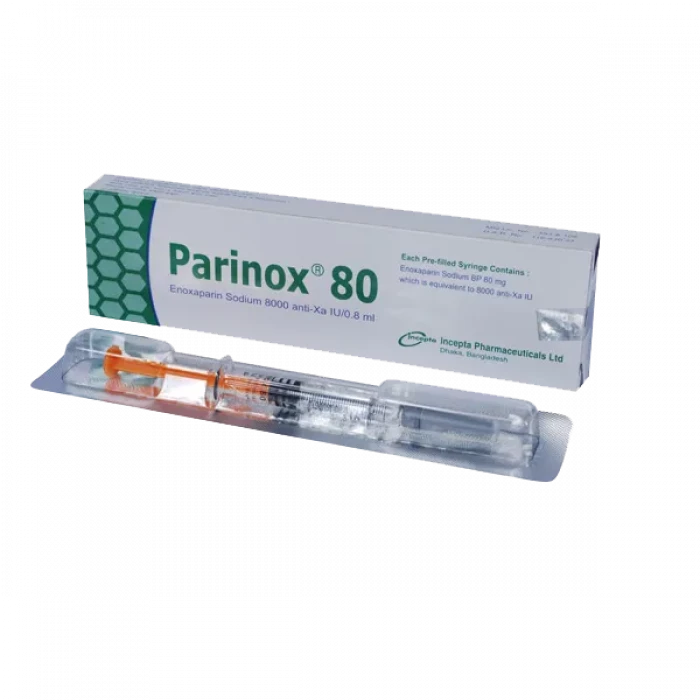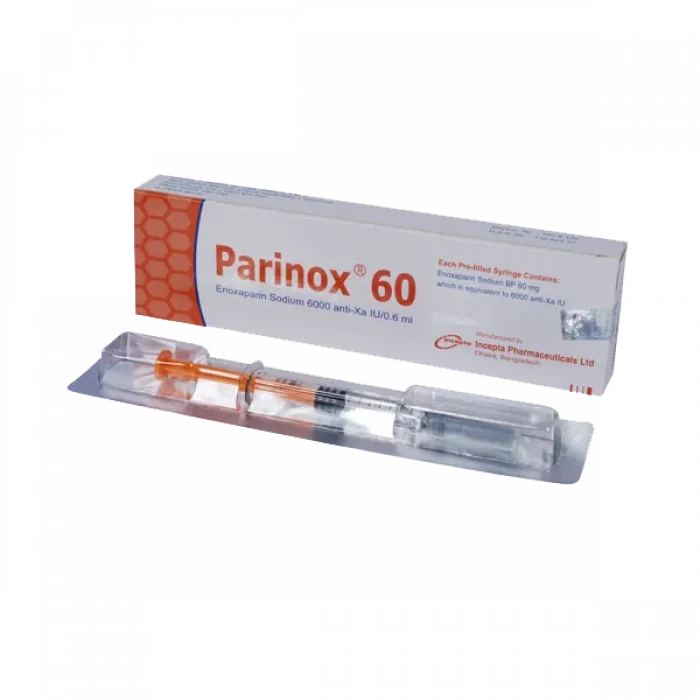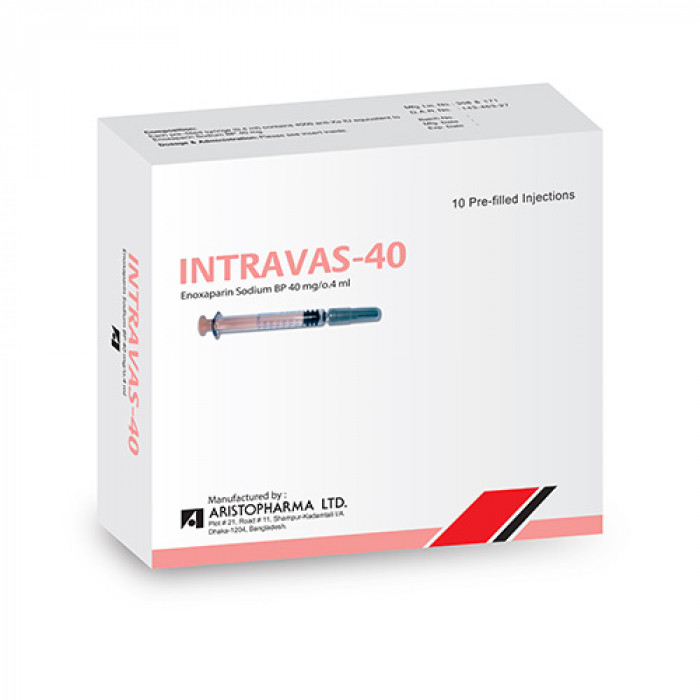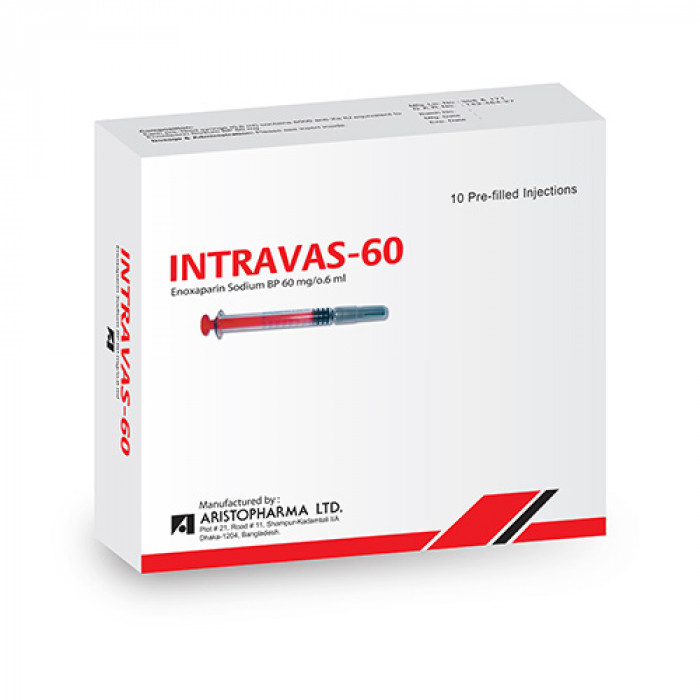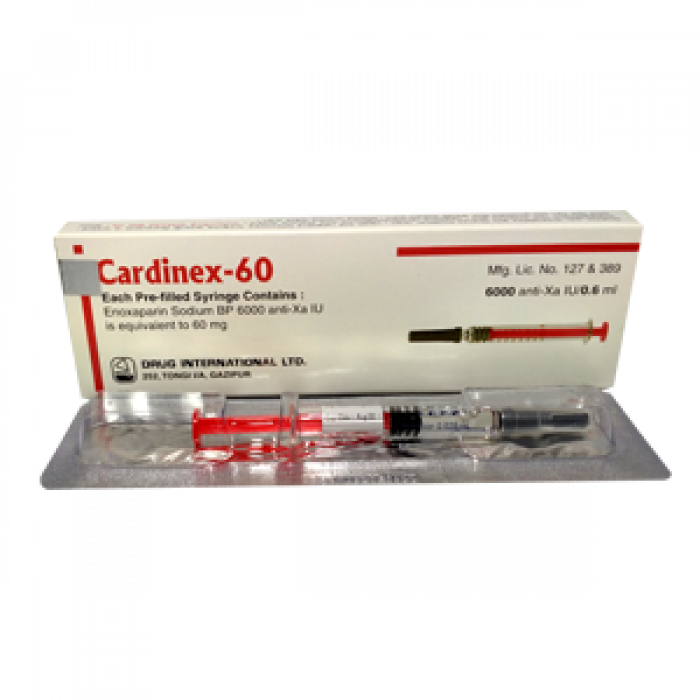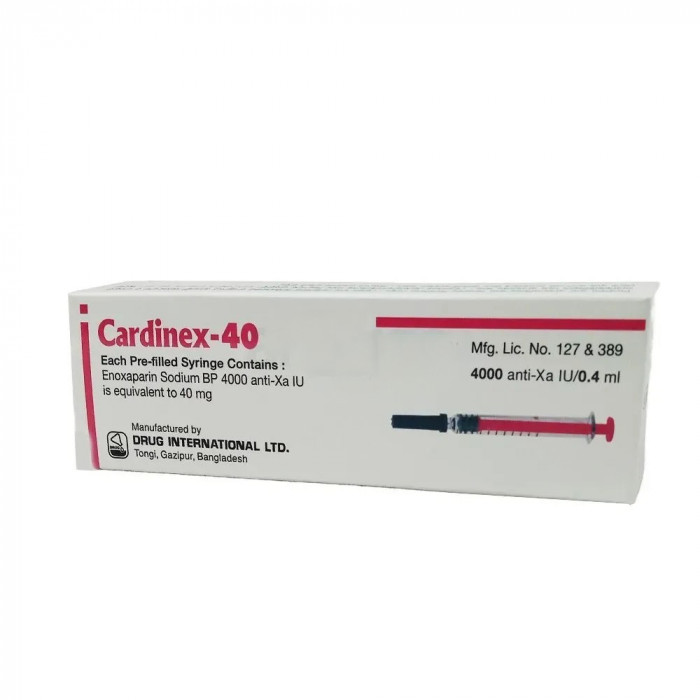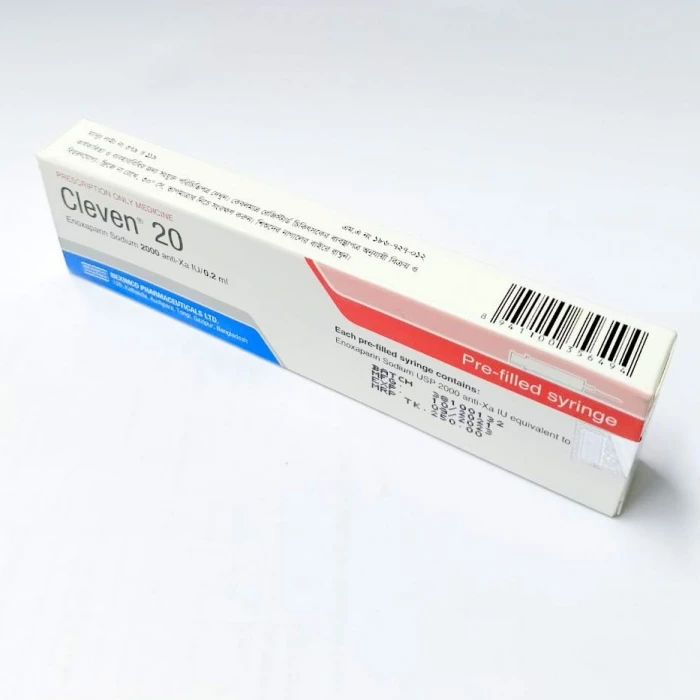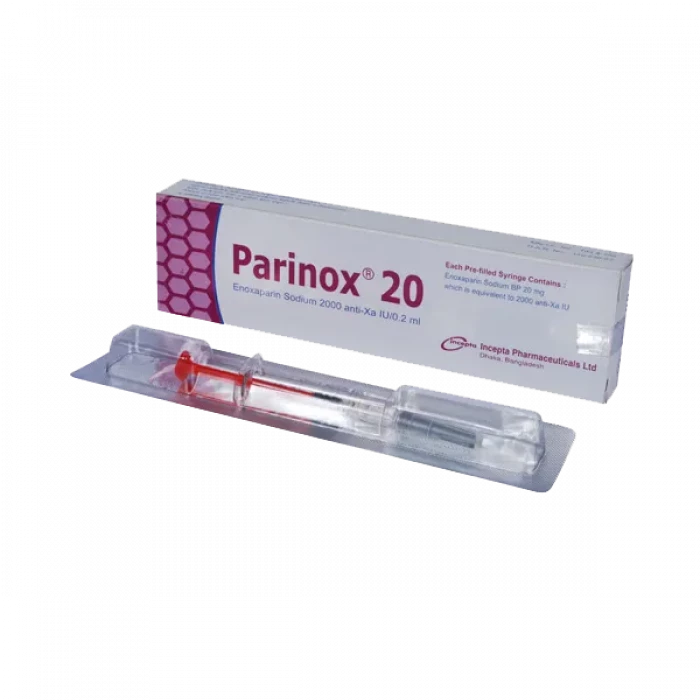
✔ 100% Authentic Product
👁️ Currently Viewing 1363
Parinox 20 Injection
Injection, Generic Name: Enoxaparin Sodium , Manufacturer: Incepta Pharmaceuticals Ltd.
Discount
Price: ৳ 190
MRP:
৳
200
5%
Off
✅ Description:
Indications of Parinox 20 SC Injection
Enoxaparin represents deep vein thrombosis, whether it is
▪ embolism of the palace.
▪ I will treat an unstable angorne myocardial infarction and non-wave and administered with aspirin simultaneously.
▪ Prevent thrombosis in extrapolation during blood dialysis.
▪ Prevention of venous thrombosis (prevention of blood flow veins formation), especially those that can be related to orthopedic or general surgical surgery.
▪ Prevention of venous thrombus diseases due to acute diseases due to acute illnesses, including cardiac dysfunction, respiratory failure, serious infections and rheumatoid diseases.
Pharmacology of Parinox 20 SC Injection
Enoxaparin sodium is a low molecular weight heparin with high antiXa activity and low antilles or antithrombin activity. At doses required for various indications, enoxaparin sodium did not increase bleeding time. At preventive doses, Enoxaparin Sodium did not cause any noticeable change in Partial Thrombosis Trigger Time (PTT). It does not affect platelet aggregation or the binding of fibrinogen to platelets. Enoxaparin sodium is metabolised mainly in the liver.
Dosage & Administration of Parinox 20 SC Injection
Treatment of deep vein thrombosis, with or without pulmonary embolism: 100 IU antiXa / kg subcutaneously twice daily for 10 days or 150 IU antiXa / kg subcutaneously once daily for 10 days. Oral anticoagulant therapy should be initiated if necessary and treatment with enoxaparin sodium should be continued until an anticoagulant effect is obtained.
Treatment of unstable angina and non-Q wave myocardial infarction, in combination with aspirin: Subcutaneous injection of 100 antiXa IU / kg x 2 times / day for 8 days. Co-administration of oral aspirin (100 to 325 mg once daily) is recommended. Enoxaparin sodium treatment in these patients should be prescribed for at least 2 days and continued until clinical stability.
Prevention of thrombosis in the supplemental blood cell circulation during hemodialysis: The recommended dose is 100 antiXa lU / kg. For patients at high risk of bleeding, the dose should be reduced to 50 antiXa IU / kg for two-vessel access or to 75 antiXa IU / kg for single vessel access. During hemodialysis, enoxaparin sodium should be introduced into the arterial line of the vessel at the start of the dialysis session.
Prophylaxis of venous thromboembolism in surgical patients:
▪ General surgery patients at moderate risk of thromboembolism (eg: abdominal surgery): 2000 IU anti Xa (0.2) ml subcutaneously) or 4000 IU antiXa ( 0.4 ml) once a day for 7-10 days. The first injection should be given 2 hours before surgery.
▪ Patients undergoing orthopedic surgery at high thromboembolic risk: 4000 antiXa IU (0.4 ml) subcutaneously once daily for 7 to 10 days. The first injection should be given 12 hours before surgery. A longer duration of treatment may be appropriate in some patients because continued treatment with 4000 IU anti Xa once daily for 3 weeks after the initial treatment has been shown to be beneficial in orthopedic surgery. 0.4 ml) once a day for 6-14 days.
Interaction of Parinox 20 SC Injection
It is recommended that agents that affect hemostasis be discontinued prior to treatment with enoxaparin sodium, unless otherwise indicated. These agents include drugs such as: acetylsalicylic acid (and derivatives), NSAIDs (including ketorolac), ticlopidine, clopidogrel, dextran 40, glucocorticoids, thrombolytics and anticoagulants, substances other antiplatelet agents, including the glycoprotein antagonist llb/llla. If the combination is indicated, it should be used with careful clinical and laboratory monitoring.
Contraindications
Patients with hypersensitivity to enoxaparin sodium, heparin or other low molecular weight heparins. Patients with heavy bleeding and conditions with a high risk of uncontrolled bleeding, including recent hemorrhagic stroke.
Side Effects of Parinox 20 SC Injection
Haemorrhage (bleeding), thrombocytopenia, increase in serum aminotransferases. Painful bluish spots at the injection site to a rash at the injection site. Cases of nerve hematoma with concomitant administration of enoxaparin and spinal / epidural anesthesia or lumbar puncture have resulted in varying degrees of neurological damage.
Pregnancy & Lactation
Pregnancy category B. In humans, there is no evidence that enoxaparin sodium crosses the placental barrier. In the absence of adequate and well-controlled studies in pregnant women, enoxaparin sodium should be used during pregnancy only if clearly needed. Pregnant women with prosthetic mechanical heart valves may have a higher risk of thromboembolism. It is not known whether enoxaparin is excreted in human milk. Because many drugs are excreted in human milk and because of the potential for serious adverse events in the nursing infant, a decision should be made whether to discontinue nursing or to discontinue Enoxaparin, taking into account the importance of Enoxaparin to the mother. and the known benefits of breastfeeding.
Precautions & Warnings
Enoxaparin sodium should be injected subcutaneously for prophylactic and curative treatment and intravascularly during hemodialysis. Do not inject intramuscularly. Enoxaparin sodium should be used with caution in conditions that increase the risk of bleeding, such as poor hemostasis, history of peptic ulcer disease, recent ischemic stroke, severe hypertension without control, diabetic retinopathy, and recent ophthalmic or neurological surgery, concomitant use of drugs that affect hemostasis. It is recommended that platelet counts be measured prior to initiation of treatment and frequently thereafter during treatment.
Therapeutic Class
Parenteral anti-coagulants
Storage Conditions
Store in a cool and dry place, protect from light and moisture. Do not store above 25°C. Do not store in a refrigerator or freezer. Keep out of the reach of children
⚠️Disclaimer:
At ePharma, we’re committed to providing accurate and accessible health information. However, all content is intended for informational purposes only and should not replace medical advice from a qualified physician. Please consult your healthcare provider for personalized guidance. We aim to support, not substitute, the doctor-patient relationship.




